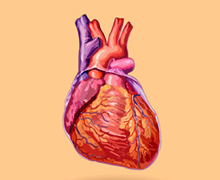
Not all atherosclerotic plaque is the same just as not all diets are the same. New research from Sweden shows if your diet is low in fiber you could be susceptible to a more dangerous type of plaque in your coronary arteries.
Scientists at Lund University discovered a link between low fiber consumption and the presence of unstable atherosclerotic plaque, a high-risk type of plaque in coronary arteries with the potential to trigger blood clots and cause heart attacks.
The researchers used computed tomography, which is an advanced form of cardiac imaging, and looked for the the presence of plaque and then determined the type. That was cross referenced with the diet of individuals to determine how it affected atherosclerosis in the coronary arteries.
"When we matched people's coronary artery images with their dietary patterns, we could not only see that there is an association between dietary pattern and the presence of plaque in the coronary arteries, but also that the composition of the plaques, how dangerous they can be, is related to diet," said Isabel Goncalves, professor of cardiology at Lund University.
The study was based on data from 24,000 people between the ages of 50 and 64 years of age. They had no symptoms of heart disease and no known cardiovascular disease prior to the study.
The participants completed a dietary questionnaire which was used to generate a score based on a dietary index that ranked whole foods such as fresh fruits and vegetables higher than processed foods such as sugary drinks and snack foods. Their score was then compared to the results of their heart scans so researchers could look for associations and patterns.
Not surprisingly, those with the lowest diet scores had a higher prevalence of atherosclerosis. Forty-four percent of those in that category had some form of coronary artery damage. And they were 1.6 times more likely to have arterial narrowing of 50 percent or more and with high-risk plaque.
Only 35 percent of those in the healthiest diet camp were found to have had some level of atherosclerosis.
"After adjusting for a variety of factors, we saw that the association between dietary patterns and atherosclerosis is mediated by abdominal obesity, high blood pressure and high levels of triglycerides," Goncalves said. "Our results suggest that an unhealthy, low-fiber diet may contribute to changes in the body and metabolism which in turn may lead to unfavorable plaque characteristics. We hope that the results of this study can encourage more proactive prevention measures and early interventions, for instance on diet."
Click here to read more in the journal Cardiovascular Research.
